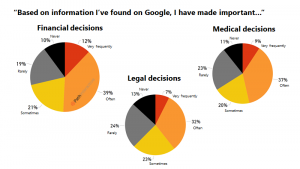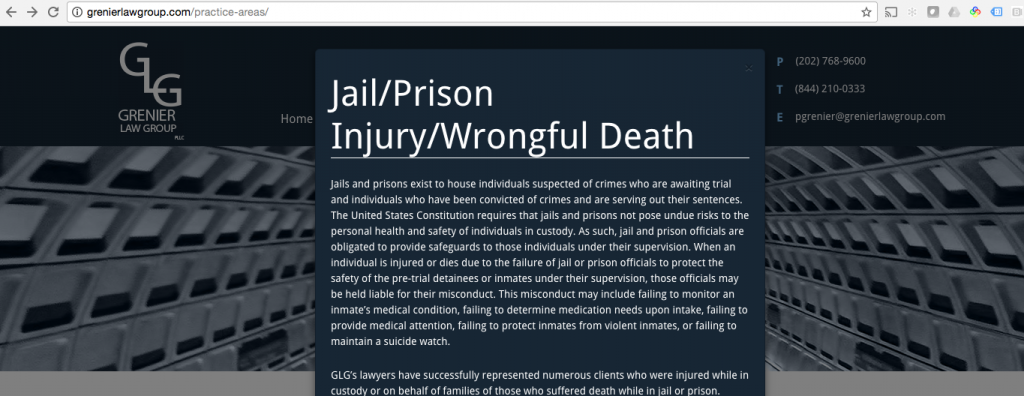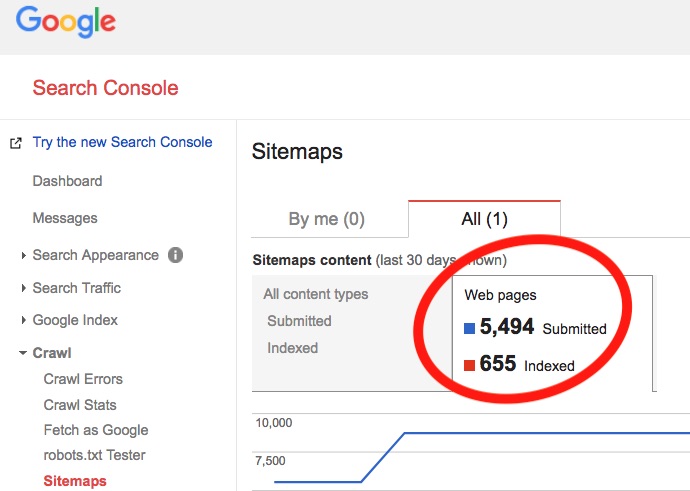In my ongoing campaign to try to get lawyers to abandon the content content content mantra spewed by inexperienced SEOs… this showcases how publishing for too much content has an overall negative impact on SEO rankings. Ben Sessions, is one of the more active SEO driven lawyers, but fell into the trap of just publishing as much as possible, in an attempt to “break into the Top 10.” What he really was doing was creating multiple pages that were all competing with each other – once we handled this content analytically and strategically, in Ben’s own words, “we broke into the top 10 for keywords I’ve been trying on for year, by making one simple change.”
Finding Your Following With a Niche Subject (And the Surprising Charm of a Mortician)
Legal writing rarely blows anyone’s socks off, and for valid reasons. Not many people want to learn about the law unless it is directly impacting their life, which makes building a dedicated following difficult. Do you know what else people don’t usually like to learn about unless they really have to?
Learning About the Funeral Industry
The beauty of the internet is that sometimes it gives you things you aren’t searching for, up to and including information on death practices. Ask a Mortician, a YouTube channel run by California mortician Caitlin Dougherty, has almost 1,000,000 subscribers. In her videos, Caitlin talks about various things, from the legality of home funerals to the fate of the bodies from the Titanic. She’s been doing this for years, and her channel has been building momentum from a relatively slow start.
So how did she do it?
Well, she started by largely posting videos on topics chosen by her viewers. As the title might suggest, people would “ask a mortician” and she would answer. By this point, she’s able to post videos on just about any topic she wants and will get pretty good viewing figures. Sounds nice, right?
But here’s the thing: it also helps her business. Caitlin helps run a funeral home, to which she gives a call out in all of her videos. She promotes their eco-friendly services and explains their processes. If it sounds surprising that this is a thing that almost a million people subscribe to, it shouldn’t be. People love learning about things they had no idea about.
Now Back to Your Firm
So what can we learn from Ask a Mortician? Well for one content can take some time to gain any traction. You might have to deal with a lot of trial and error as far as what actually gets any traffic.
Second, think about what people might not know. Have you run into any obscure laws in your state/practice area? What do you learn in law school that is immediately proven wrong in the real world? Do you have any stories about funny scenes that have happened in court that you can share? What do you bring to the table?
Third, you need to learn how to adjust course and build off what’s working. See what types of content people really seem to like. Keep making more of that. Maybe it’s videos, maybe it’s blog posts, maybe it’s a podcast. Find where you fit.
Fourth, find your voice. You need to have an identifiable voice that people what to hear from. Maybe it will take you a few weeks to find your voice, maybe it will take a year. No matter how long it takes, find it then keep it consistent.
Is It Worth the Time Commitment?
I mean, sometimes. It certainly worked for Caitlin and her funeral home, but it’s definitely not worked for countless other creators. Whether or not it’s worth it is up to you. Are you willing to put in the hours for a potential flop?
What Does “Trust” Mean for the Legal Industry
Google can and will provide answers for just about any question you might have, but just because it provides the answer doesn’t mean you need to accept it. From queries regarding laws to questions about health, a lot of user searches impact the legal industry. Because of this, it’s important to understand how and where users trust their search results.
A recent survey by Path Interactive looked into this very question, focusing specifically on medical and political queries, but touching on legal advice. These graphs show some of their findings from a sample size of 1,100 respondents:

What Can We Read Into Here?
The first thing we can take away is that fewer people make important legal decisions than medical or financial decisions based on information from Google. Only 32% of respondents often make legal decisions based on Google results, compared to the 39% who often make financial decisions and 37% that often make medical decisions.
So what does this mean? Well, for one let’s take a few things into account here. We learn to take care of our health and finances from a pretty young age, without professional help. Most of us learn how to handle a common cold, injuries, and basic savings and spending. We don’t all learn how to appeal a criminal charge from our parents.
This means that more people may feel comfortable handling their own financial and medical issues based on advice from Google, but will seek professional advice for legal questions.
The fact that fewer people make legal decisions based on Google results is probably actually good business, since that means consumers are less likely to take things into their own hands and will instead hire a professional. User’s distrust of Google might be to your benefit.
Using the Data
Beyond making major life decisions, the survey looked into whether users find featured snippets and knowledge panels trustworthy. For the most part, they do. Of the respondents between the ages of 26-35, 44% find knowledge panels very trustworthy and 25% find featured snippets very trustworthy.


This provides a good opportunity for visibility. If users are looking for trustworthy information but are less likely to make legal decisions based on search results, they are likely looking for professional help. You are that professional help. If you can grow your image through trustworthy content, you can grow your client base.
Why None of This Is New
E-A-T has been a part of Google’s best practices for a long time now, with the “T” in E-A-T standing for trustworthiness. In an ideal world, you would have been producing trustworthy content for years now. Maybe you already have been. Good for you!
But if you haven’t been producing trustworthy content, you really should start. You don’t need a lot of it (content for content’s sake isn’t worth it), but proving your firm to be a helpful resource usually pays off in the long run.
In Conclusion
Expect your incoming clients to have done some research on their case prior to hiring you. People are becoming more proactive online, and the legal industry is one of the industries where consumers are less likely to try and take problems into their own hands. This is to the benefit of law firms. It means that users are not only searching for reliable information, which you can provide, but are also looking for someone to hire, which you can also provide.
If you want to learn more about how your content can improve your business, you might want to look into our content development plans. Mockingbird has years of experience helping law firms audit their content and develop ongoing plans. Contact us to learn more.
How to Get The Most Out of Your Blog
Maintaining a blog can feel like a fruitless chore, believe me, I get it. You can add and add to it and see no returns on 95 percent of your blog posts. So how can you turn it around and how can you know if it’s even worth it to keep going?
Breaking Out of the Spiral of Dis-Content
If you feel like your blog is going nowhere, chances are you don’t have a clear idea of where it’s supposed to go. Without a goal in mind it’s impossible to write functional content.
Your first step is deciding what type of audience you’re writing for, and what part of that audience you want to become clients. Write about what they want to know and, more importantly, what they need to know. This will help you figure out where your blog is going and will hopefully inspire some interesting posts that drive traffic.
Linking to Your Practice
One of the important things to remember about your blog is that it doesn’t have to be directly related to your practice area. You can write about a specific subsection of the law that you find particularly interesting. This will help you stay interested in it while also starting to rank for those long-tail keywords.
Once you’ve figured out your focus, you can try to find places where it might link to your firm as a whole. Think of where it overlaps with your practice areas. This will help traffic flow to the rest of your site and into your firm.
Find a Schedule That Works for You
Daily blogs can honestly be a bit excessive. Annual blogs are a bit sparse. Try to find a schedule that makes sense given your bandwidth and list of ideas. This might mean once a week, twice a month, once a month, or any period.
Once you have found a cycle that works for you be sure not to get married to it. If a current news story is incredibly relevant to your practice or your blog, write a surprise post. Staying flexible will be your friend.
Guest Post
As far as publicity and link building goes, not much works better than guest-blogging. If you can write a post for a well-known publication, or get a well-known author write a post for you, you are building the authority of both you and your blog.
Stop the Blog if it Isn’t Working
Not all law firms need blogs. They aren’t a requirement for your bar membership and if no one’s reading it, it’s just costing time. Try to take steps to improve it, but if it still isn’t driving any traffic after a year or 18 months, don’t feel bad for abandoning it. You can pick it up again at any point if you feel the desire, but don’t feel bad for not doing that.
If you are worried about your blog and feel like your content could be improved, consider our content development plan. Mockingbird can help you audit your blog, cut what’s slowing your site down, and make a plan for building on what you need. Contact us to learn more.
Link Building: Where to Start
Starting a Link Building Project
Link building is one of the building blocks of SEO. It helps to make connections, building domain authority, and motivating you to create interesting content. We all know this, but where do you start? Well, let’s start with where not to start.
Avoiding Schemes and Scams
There are countless businesses around promoting opportunities to buy lots of links for cheap. Don’t utilize them. Link building schemes are great for short-term growth and long-term destruction. And the growth isn’t even real since the incoming traffic rarely converts or interacts.
Bottom line: don’t buy links.
Finding (Legitimate) Opportunities
Looking for places that will provide you with links or are willing to collaborate is hard work. It helps to begin where you are more likely to get a response. This could be directories, local newspapers, even alumni newsletters. These are examples of places where you can simply add a link to your website’s homepage or your attorney profile and call it a day.
One technique we like using here at Mockingbird is Lookback Link Building, a termed coined in-house. It can help get high-quality links without asking publications to change recent pieces.
The next level of link building is guest blogging or writing content that sites want to link to. This usually takes either an extreme talent for writing alongside high subject matter expertise or a longstanding and good reputation in the field. You should always aim for creating the highest quality content as possible, but the bar is a bit lower if you’re already a well-known name.
Building Connections
Making connections is hard in this world, and it’s even harder when you’re asking for a favor. Prepare yourself for a lot of rejection and even more indifference. A lot of your requests will be ignored. You learn to live with it.
So what do you do once you make a connection? If the type of link you’re requesting is just putting a link in an article where the firm or attorney is mentioned, ask for that. Explain how it will help the readers who might want to learn more about the subject. Try not to make it sound like a business transaction. People don’t like feeling like they’re giving you something for free.
Beyond singular links, you need to build connections with publications and websites that might be open to collaborating with you as a subject matter expert. This means that they would be open to you writing guest pieces or linking to your content. This is a great position to be in. If you find yourself with these types of connections, don’t piss them off. They’re your ticket to a high domain authority.
The Benefits of Link Building
If you aren’t convinced that an improved backlink profile will help you out, we have multiple case studies to show you otherwise:
Creating a Content Development Plan
A good website is like a good sandwich: it can look amazing from the outside, but if it doesn’t taste good then it’s a bad sandwich. The best way to make sure you have a good sandwich is to make sure you have the right ingredients and organize them in the right way.
In case my metaphor is too wandering, content is to a website as ingredients are to a sandwich. While you can accidentally throw together an amazing sandwich, your best bet is to plan ahead.
Auditing The Content You Have
Every law practice has a set of required pages for its site to be an adequate resource for potential clients. These include:
- A homepage
- A contact page
- An about page
- Individual practice area pages
- A resource page, whether it’s FAQ or a blog
Before you even consider adding extra content you need to audit your current pages. Are they optimized and well written? Do you have the basics? If you don’t, fill out your pages with the barebones.
On the other side of things, some websites have way too much content. You might need to prune some of it back. If there’s duplicate content or orphan pages your site could suffer. You don’t want a sandwich full of iceberg lettuce. No one likes that.
Adding The Content You Need
Once you have figured out what your site is missing, you can get to work adding it. This is a great opportunity to optimize your site! If your existing pages haven’t been updated since 2009, update them now! You’ll be amazed at all the plug-ins available (also, no one uses Flash anymore; get rid of any plug-ins that require Flash ASAP). You need to make sure you have the fillings of your sandwich before you even think about condiments.
Adding Extra Content
Extras normally include pages like regular blog postings, successful case results, and in-depth resources. To make sure your pages are getting you the traffic and clients you want, you need to ask yourself a few questions before beginning work:
- What types of cases do I want? You can control what type of audience visits your website through the content you produce. If you have resources in greater depth on a specific issue than any other website, people looking into that issue will find their way to your page. It might not get high traffic, but it will get the right traffic.
- What type of expertise are my clients looking for? You’re a lawyer, so you’re in competition with every lawyer in your practice in your area. You need to show that you can not only stand toe-to-toe with any of them, but you are also more knowledgeable than them. Write about the specifics of your practice areas, things that might not show up on the practice area page. Prove you’re an expert.
- What is my voice? Your voice is a vital part of your brand. Some firms put more personality in their blogs, some keep it strictly academic. You need to decide what voice you’re putting into the world and keep it consistent.
Once you have answered these questions about yourself, you’re ready to start writing.
Consider SEO
SEO is often considered something that can be accounted for later but is really much easier to just account for now. There are ways to optimize a page that barely even impacts writing. Four things you can do to improve SEO without even trying are:
- Organizing H1s, H2s, and H3s. By setting up your headers that accurately summarize and organize your page you are letting search engines know the content and composition of the page.
- Adding bullet-pointed or numbered lists. Just like with headers, lists help search engines know how you’re organizing your page. A header with a well-designed list can even create a nice featured snippet if you’re lucky.
- Internal linking. Linking to other pages on your site not only improves the user experience by helping them visit the rest of your website but it also really helps with SEO.
- Add relevant images. Images help to make your page look nicer, and relevant images with accurate alt-text are particularly appreciated by search engines.
If you’ve noticed that pretty much all of that advice has been used in this post, good job! Sandwich for you!
Getting Help
Not every law firm has the time or writing expertise to do in-house content audits or plan development. This is understandable since the law is a complicated subject with a lot riding on it. You can’t be expected to spend all your time brainstorming your next FAQ.
Mockingbird is here to help. We are proud of content audits and development plans and will help with link building and PR campaigns to improve your website’s rankings and increase your organic traffic. If you feel like your website could be performing better, don’t hesitate to call us! Helping lawyers is what we do.
Google Doesn’t Care About “Fresh” Content (So Says Google)
I’ve been writing about how Google doesn’t care about your “fresh” content for ages now. Mockingbird’s analysis of hundreds of thousands of pages of legal content (and I use the term “content” liberally here) across hundreds of law firm websites have confirmed this.
And yet, the legal marketing industry keeps telling you to publish publish publish in order to make The Google happy. As an industry, it’s super convenient to blame our failings on your lack of feeding the content beast. Or, it’s super convenient to have contracts that promise we’ll vomit out poorly rewritten news articles at a pace of X per week. Tangible, predictable projects to validate a bloated retainer that funds an offshore “writer” at exorbitant margins. One vendor claims as their tagline: “real lawyers have blogs” – as in, you aren’t a lawyer unless you feed The Google a steady diet of (largely unread) blog pages.
Except of course, all of this focus on bloated website pagecount rarely translates to increased traffic, calls or clients. That’s because of the fallacy that the frequency of publishing is a major SEO factor. You may have also heard this referred to as “fresh content.” The reality is, there are some industries (legal being one of them) in which “fresh” content isn’t necessarily better. i.e. It’s very difficult to have fresh content about trucking accidents on a regular basis.
But, like lemmings intent on a final trip to the sea, the legal marketing industry keeps reciting the mantra: “content is king.” We keep pushing you to sign engagements in which we promise we’ll deliver 4 blog posts a week. (and if 4 is good, wouldn’t 40 be better? Can I get a 104?) We wax poetic about the long tail and the need for more and more content to catch this elusive tail. We tell you that Google wants your content to be fresh as a baguette at a quaint French cafe at 6am.
Finally, straight from The Google’s mouth, the answer to the question: “Does Google favor fresh content?” in two characters:
Hat tip to Barry Schwartz (who apparently has more time to follow John Mueller, than I do.)
If you feel like diving deeper, feel free to peruse any of the following articles I’ve penned panning our myopic love of content:
SMX: More content, less traffic
SMX: More content, less traffic: Part II
Mockingbird: SEO Regicide, Content the King is Dead
Mockingbird: Another Indicator that your “SEO Content” is Awful
Mockingbird: Your Legal Blog Content isn’t as Good as you Think it is.
Another Indicator That Your “SEO Content” Is Awful
I’ve been railing against the conventional wisdom that more content is the magic SEO bullet for years now. In fact, for many of our clients, we’ve been proactively working on decreasing pagecount, instead of increasing it. There’s a great framework for assessing the value of investing more money on more content in a Searchengine Land article I wrote that essentially shows how to evaluate the efficacy of content in actually generating traffic. Simple stuff, but often overlooked – which is crazy given the vast investment many lawyers make in vomiting out more content at a regular clip.
There’s an even easier way to review this through a very simple report in Google Search Console. This simple report shows the number of pages in your sitemap compared to the number of pages in your sitemap that are actually indexed. In the extreme example below, less than 12% of their sitemap is actually indexed. This means while Google knows about the content, they don’t actually care and those pages will NEVER surface in search results.
Note that this could be for a variety of reasons:
- The sitemap is dated and/or broken and showing pages that don’t exist (this happens more frequently than you can imagine)
- The site has a tone of content, yet lacks the authority (backlinks) to support the volume of content.
- The content on the site is extremely poor and/or copied.
Assuming the sitemap is correctly configured…if the vast majority of your blog isn’t being indexed…why would one continue generating content?
How to Inadvertently Hide Your Content (And Gut Your Site) with Pop Ups
Got another call from a lawyer whose website, he thought, was underperforming. A quick review of the site shows why….
While the site is visually fine, note that all of his practice areas display as pop ups on the same URL…the individual practice area content doesn’t actually exists at his URL: http://grenierlawgroup.com/practice-areas/. (Note below – the URL for this practice area is stuck at /practice-areas/, as is all their other practice area content.



